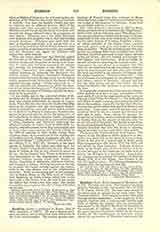

Eusebius, Saint, POPE, successor of Marcellus, 309 or 310. His reign was short. The Liberian Catalogue gives its duration as only four months, from April 18 to August 17, 309 or 310. We learn some details of his career from an epitaph for his tomb which Pope Damasus ordered. This epitaph has come down to us through ancient transcripts. A few fragments of the original, together with a sixth-century marble copy made to replace the original, after its destruction, were found by De Rossi in the Crypt of Eusebius, in the catacomb of Callistus. It appears from it that the grave internal dissensions caused in the Roman Church by the readmittance of apostates (lapsi) during the persecution of Diocletian, and which had already arisen under Marcellus, continued under Eusebius. The latter maintained the attitude of the Roman Church, adopted after the Decian persecution (250-51), that apostates should not be forever debarred from ecclesiastical communion, but on the other hand should be readmitted only after doing proper penance (Eusebius miseros docuit sua crimina flere).
This view was opposed by a faction of Christians in Rome under the leadership of one Heraclius. Whether the latter and his partisans advocated a more rigorous (Novatianist) or a more lenient interpretation of the law has not been ascertained. The latter, however, is by far more probable, in the hypothesis that Heraclius was the chief of a party made up of apostates and their followers, who demanded immediate restoration to the body of the Church. Damasus characterizes in very strong terms the conflict which ensued (seditio, coedes, bellum, discordia, lites). It is likely that Heraclius and his supporters sought to compel by force their admittance to divine worship, which was resented by the faithful gathered in Rome about Eusebius. In consequence, both Eusebius and Heraclius were exiled by the Emperor Maxentius. Eusebius, in particular, was deported to Sicily, where he died soon after. Miltiades ascended the papal throne, July 2, 311. The body of his predecessor was brought back to Rome, probably in 311, and September 26 (according to the “Depositio Episcoporum” in the Chronographer of 354) was placed in a separate cubiculum of the Catacomb of Callistus. His firm defense of ecclesiastical discipline and the banishment which he suffered therefor caused him to be venerated as a martyr, and in his epitaph Pope Damasus honors Eusebius with this title. His feast is yet celebrated on September 26.
J. P. KIRSCH

